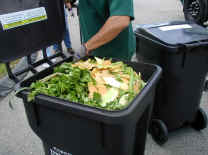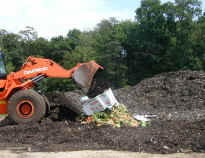Commercial Organics Collection Pilot Begins
 On August 4, 2003, the towns of Groton and Stonington began collecting source separated organic materials from participating commercial establishments. Funded in part by a DEP grant, the goal is to recycle food waste and waxed corrugated cardboard from commercial generators such as grocery stores, restaurants, and conference centers.
On August 4, 2003, the towns of Groton and Stonington began collecting source separated organic materials from participating commercial establishments. Funded in part by a DEP grant, the goal is to recycle food waste and waxed corrugated cardboard from commercial generators such as grocery stores, restaurants, and conference centers.
Both Groton and Stonington are unique in that they have mandatory volume-based user fees for commercial waste generators. The towns go out to bid and contract for waste removal, then bill the businesses according to how much waste they generate. Recycling is provided at a lesser cost. Therefore, it is in the Town’s best interest to provide as many recycling opportunities as possible to help reduce individual costs for waste disposal…hence, this pilot.
 So far, twelve businesses have signed-up for the voluntary pilot, and more will be added as interest grows. Businesses are provided with free 64 or 32 gallon wheeled totes, signage, training, and a participation sticker for their window. During the pilot, removal costs will be zero. F.E. Crandall is doing the collection that currently occurs three days per week, but may be modified as data is collected and analyzed. Totes are emptied, rinsed on-site, and returned with a small amount of wood chips in the bottom. The wood chips help absorb liquids and keeps food from sticking to the bottom of the cart.
So far, twelve businesses have signed-up for the voluntary pilot, and more will be added as interest grows. Businesses are provided with free 64 or 32 gallon wheeled totes, signage, training, and a participation sticker for their window. During the pilot, removal costs will be zero. F.E. Crandall is doing the collection that currently occurs three days per week, but may be modified as data is collected and analyzed. Totes are emptied, rinsed on-site, and returned with a small amount of wood chips in the bottom. The wood chips help absorb liquids and keeps food from sticking to the bottom of the cart.
The carts are being weighed and the contents observed at every collection. This will help establish how many carts particular businesses will need, identify where more training is needed, estimate diversion rates, track trends in participation, and determine cost effectiveness. Preliminary data from the first two weeks of collection shows that an average collection day yields about 1.8 tons of organics. This will obviously vary with the seasons and as more businesses are added.
 Once the collection route is completed, the food and waxed cardboard are taken to Earth Care Farm in Charlestown, Rhode Island. It is the closest facility that accepts pre and post consumer food waste. The owner of this farm, which grows organic food and is a licensed food waste compost facility, is very particular about the quality of organics he accepts for recycling because he sells a high-end compost product. Therefore, it is very important that there are no physical contaminants with the food waste that would render the resultant compost unmarketable. Inorganic items such as individual serve condiment wrappers and plastic butter pats, twist-ties, rubber bands, plastic wrap, plastic straws, rubber gloves, etc, are not allowed in the organics container. Reduced tipping fees are charged for "clean" loads; however, persistent poor quality loads could cause the farm to stop accepting the pilot’s organics. With no alternative site available, this could effectively shut down the pilot. Eliminating contamination will be one of the biggest challenges of the pilot.
Once the collection route is completed, the food and waxed cardboard are taken to Earth Care Farm in Charlestown, Rhode Island. It is the closest facility that accepts pre and post consumer food waste. The owner of this farm, which grows organic food and is a licensed food waste compost facility, is very particular about the quality of organics he accepts for recycling because he sells a high-end compost product. Therefore, it is very important that there are no physical contaminants with the food waste that would render the resultant compost unmarketable. Inorganic items such as individual serve condiment wrappers and plastic butter pats, twist-ties, rubber bands, plastic wrap, plastic straws, rubber gloves, etc, are not allowed in the organics container. Reduced tipping fees are charged for "clean" loads; however, persistent poor quality loads could cause the farm to stop accepting the pilot’s organics. With no alternative site available, this could effectively shut down the pilot. Eliminating contamination will be one of the biggest challenges of the pilot.
It is much too early in this pilot to draw any conclusions as to the success of the program. The learning curve is steep, especially for businesses with high employee turnover rates due to the seasonal tourist trade. And, it will take time to recruit more businesses and analyze the economics. There is no doubt that tweaking will be needed, but if successful, this program will benefit everyone involved…including the environment.
More photographs of this project are available:
Commercial/Institutional Food Waste Composting
Content Last Updated February 11, 2020

